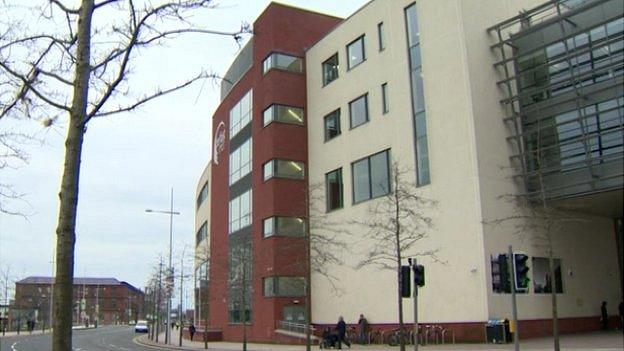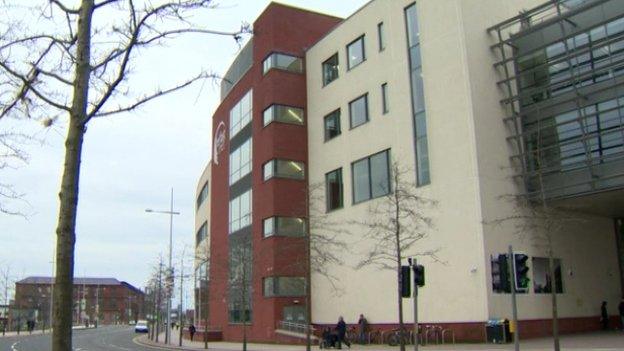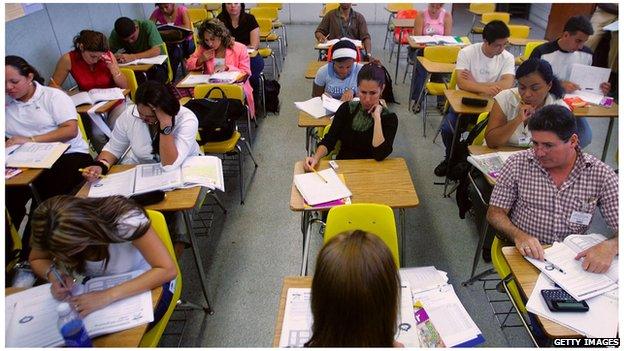Further education: Up to 500 staff offered voluntary exit deals
- Published

Those taking redundancy at higher education colleges such as Belfast Metropolitan College, include lecturers and college support staff
Voluntary redundancy deals have been offered to almost 500 staff in Further Education (FE) colleges by the Department for Employment and Learning (DEL).
The department is funding redundancies for 212 staff who have already applied to leave before the 2015/16 academic year.
It has told a further 285 staff they can leave during the year.
Those taking redundancy include lecturers and college support staff.
If all the staff go that will reduce the further education workforce in Northern Ireland, which stands at about 4,100 full-time equivalent staff, by just over 12%.
The cost of the redundancies was due to be funded under the civil service voluntary exit scheme.
As part of the Stormont House Agreement, the £700m scheme's future is uncertain due to the Northern Ireland Executive's continuing discord over welfare reform.
'Degree of risk'
DEL Minister Stephen Farry has now decided to use his department's budget to fund the initial 212 applications.
That will cost £9.4m.
Mr Farry said that, in the absence of the voluntary exit scheme being agreed, he may also use his department's budget to meet the costs of the additional 285 staff who have been made offers to leave later in the academic year.

Stephen Farry said that further educations colleges have prepared for the reductions in staff
He said the initial 212 redundancies would save his department money in the long run.
"We will be finding a saving of £7.5m year after year, so it makes sense to proceed even though there is a degree of risk," he said.
'Little alternative'
"In the event a decision is taken on the main scheme for the public sector as a whole, then we hopefully will be able to backdate the money out of that scheme itself."
He said that colleges had prepared for the reductions in staff.
"If you look at the further education sector, they have a very heavy proportion of their budget spent on staffing themselves," he said.
"So whenever we pass on, very regrettably, cuts to the sector, they've very little alternative than to look at their staffing complement.
"But I'm confident the sector can respond very positively to this.
"We've worked closely with the colleges and the trade unions, and I think everyone understands this is something we have to go through to ensure we have a modern, fit for purpose, public sector."
Mr Farry also said it was important he acted now to end uncertainty for colleges and staff.
"If I was to stand back and allow this situation to drift over the summer, we would be a year delayed in making those efficiencies, and there would be many more costs to be borne by the sector itself."
The department's budget was reduced by £62m earlier this year, from £756m to £694m.
As a result, the further education sector faces budget cuts of £12m.
Uncertainty
The initial 212 staff had ended the summer term unsure if they would have to return to work, but were told on 9 July that their redundancy applications had been approved.
They are entitled to a redundancy payment of one month's gross salary for every year of service, up to a maximum of 21 months, as part of the process.
About a quarter of further education staff - more than 1,100 - had initially expressed interest in the voluntary redundancy scheme.
The Stormont House Agreement included plans for the Northern Ireland Executive to borrow up to £700m over four years to fund the scheme.
Of that figure, £200m was to be made available to fund public sector voluntary redundancies in 2015/16.
As a result of the uncertainty over the agreement, many public sector staff are unsure whether they will be allowed to take redundancy in September.
More than 7,000 civil servants have expressed interest in the scheme and 1,200 of those have been told they can leave, depending on funding.
DEL is the second executive department to decide to use its own budget to fund redundancies for some staff, in the absence of agreement on the wider scheme.
Earlier this month, the Education Minister John O'Dowd decided to spend £5m to allow 131 school staff to leave their posts.
- Published26 March 2015

- Published25 March 2015

- Published3 October 2014
